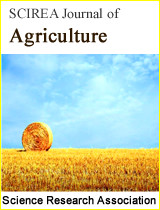Design of Fermentation Liquid Mixer of Coffee Beans
DOI: 10.54647/agriculture21259 131 Downloads 162064 Views
Author(s)
Abstract
Indonesia is one of the fourth largest coffee producers in the world. Arabica and Robusta coffee are types of coffee that are quite widely grown in Indonesia. Both types of coffee are partly grown organically; namely coffee whose entire cultivation process does not involve chemicals such as pesticides or fertilizers derived from chemicals. Organic coffee can be processed into coffee that has a distinctive taste. The coffee processing process is now very modern and has various processes and stages. The coffee processing process is also influenced by the characteristics of each coffee company, wet and dry processes. One method of processing coffee is through a fermentation process by adding bio ghally. To mix the solution, a mixer is needed. Coffee bean mixing equipment with bio ghally liquid fermentation liquid is a tool in the stages of the coffee bean processing process to assist the process of mixing and wetting coffee beans with bio ghally liquid prior to the fermentation stage. The purpose of this research is to design and manufacture a coffee bean mixer of bio ghally fermented solution. This tool is designed to mix coffee beans with fermented liquid with a capacity of 25 kg and within 15 minutes. Machine parts include the frame, hoper, mixing tube, drive motor and transmission. The results of the testing process for this coffee bean mixer show that the process of mixing 25 kg of coffee beans took 15, 17 minutes.
Keywords
bio ghally, coffee beans, mixer
Cite this paper
Warji Warji, Tamrin Tamrin, Sapto Kuncoro, Bambang Joko Sudarsan,
Design of Fermentation Liquid Mixer of Coffee Beans
, SCIREA Journal of Agriculture.
Volume 7, Issue 1, February 2022 | PP. 1-9.
10.54647/agriculture21259
References
| [ 1 ] | Adebukola, A. A., and Patrick, O. A. 2019. Development and evaluation of a fish feed mixer. AgricEngInt: CIGR Journal 21:226-233. |
| [ 2 ] | Cortez, J.G. and Menezez, H.C. 2000. Recent Developments in Brazilian Coffee Quality: New Processing Systems, Beverage Characteristics and Consumer Preferences. In: Sera T., Soccol C.R., Pandey A., Roussos S. (eds) Coffee Biotechnology and Quality. Springer, Dordrecht. https://doi.org/10.1007/978-94-017-1068-8_3. |
| [ 3 ] | Martauli, E. D. 2018. Analysis of coffee production in Indonesia. Journal of Agribusiness Science 1: 112-20. |
| [ 4 ] | Mayrowani, H. 2013. Policy for providing postharvest technology for coffee and its development problems. Forum Penelitian Agro Ekonomi 3:31-49. |
| [ 5 ] | Niranjan, K., Smith, D. L. O., Rielly, C. D., Lindley, J. A., and Phillips, V. R. 1994. Mixing Processes for Agricultural and Food Materials: Part 5, Review of Mixer Types. J. Agric. Engng Res. 59:154-161. |
| [ 6 ] | Sembiring, N. B., Satriawan, I. K. and Tuningrat, I. A. M. 2015. The added value of processing arabica coffee in wet (west indischee bereding) and dry (ost indischee bereding) processing in Kintamani sub-district, Bangi. Jurnal Rekayasa dan Manajemen Agroindustri 3:61-72. |
| [ 7 ] | Siregar, Z. A., Suthamihardja, R. T. M., and Susanty D. 2020. Characterization of Fermented Arabic Coffee (Coffea Arabica L.) with Lacto Acid Bacteria (Lactobacillus Sp). Jurnal Sains Natural Universitas Nusa Bangsa 10:87-94. |
| [ 8 ] | Sun, J., and Zhuo, D. P. 2019. Extrusion-Based Multiple Material Mixer Design in Food Printing 5:121-126. |
| [ 9 ] | Swiranat, I. W., Mangku, I. G. P., and Rudianta, I. N. 2020. The effect of fermentation and drying method on the quality of Arabica coffe (Coffea arabica L.). Gema Agro 25:150-158. |
| [ 10 ] | Thalia, T., Ersan, Delvitasari, F. and Maryanti. 2018. Fermentation effect of S. cerevisiaeon to Robusta coffee quality. Agritrop 18:60-77. |
| [ 11 ] | Usman, D., Suprihadi, A. and Kusdiyantini, E. 2015. Robusta coffee (Coffea canephora) fermentation using lactic acid bacteria isolate from civet feces with long incubation time treatment. Jurnal Biologi 4:30-41. |

